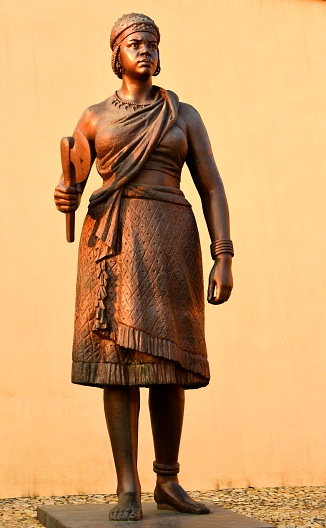
Nzinga Ana de Sousa Mbande was a formidable queen who ruled the Ambundu Kingdoms of Ndongo and Matamba. These kingdoms are situated in what is now northern Angola. Throughout her illustrious reign as a notable figure in southwest Africa.
In Angola and the larger Atlantic Creole culture, Njinga has become more and more known over the ages. Both during her lifetime and after her death. Her political savviness, intelligence, diplomacy, and military tactics have earned her recognition.
In 1617, Nzinga's brother Mbandi became a ngola after Kilombo's death. He took the throne through a violent purge, eliminating rivals, including Nzinga's Ana older half-brother and his family. Though Nzinga was spared, her young son was killed, and she, along with her sisters Kambu and Funji, were sterilized to prevent any future challenges to Mbandi's rule.
There was a long-standing rivalry between Nzinga and her brother, which may have contributed to her harsh treatment. Fearing for her life, Nzinga fled to the Kingdom of Matamba.
After consolidating his power, Mbandi continued the war against the Portuguese. Despite allying with the Imbangala, he struggled militarily, leading to significant Portuguese gains.
In 1621, he asked Nzinga Ana for help and sent her to negotiate with the Portuguese in Luanda. Fluent in Portuguese, Nzinga agreed, on the condition that she could represent Mbandi and be baptized.
Upon arriving in Luanda with her entourage, Nzinga attracted attention. The Portuguese governor, João Correia de Souza, even covered her party’s expenses.
While other Ndongo leaders wore European clothing, Nzinga chose traditional attire, demonstrating pride in her culture. During negotiations, Nzinga used flattery and diplomacy, contrasting her approach with her brother's aggression.
After the meeting, Governor de Sousa noticed Nzinga's slave girl still crouching, but Nzinga calmly explained that the woman was a gift. She cleverly implied that her envoy never used the same "chair" twice, as she had many such gifts.
As an ambassador, Nzinga Ana worked towards establishing peace between the Ndongo kingdom and the Portuguese. She proposed ending hostilities, allowing Portuguese slave traders in Ndongo, and offering to return escaped Portuguese slaves.
In return, she demanded the removal of Portuguese forts from Ndongo territory. She also refused to pay tribute, asserting her people's strength.
Nzinga also suggested mutual support against common regional enemies. To show her commitment to peace, she publicly converted to Christianity through baptism in Luanda.
Nzinga takes on the name Dona Anna de Sousa. De Sousa and his wife Ana da Silva became her godparents. Eventually, a peace treaty was signed, and Nzinga returned to Kabasa in late 1622, marking the successful conclusion of her mission.
However, despite Nzinga's negotiations with the Portuguese, peace between Ndongo and the Imbangala collapsed. The Ndongan royal family was ousted from Kabasa, leading to the king's exile and the establishment of the Kasanje Kingdom by some Imbangala.
Though de Sousa was committed to upholding the treaty, he refused to assist Ndongo against the Imbangala until Kabasa was recaptured and Mbandi baptized. Mbandi reclaimed Kabasa in 1623 and cautiously embraced Catholicism, but he remained wary of the Portuguese.
Nzinga Ana de Sousa Mbande, gaining influence in the royal court, convinced her brother to reject baptism, likely to satisfy his traditionalist supporters.
Despite efforts for peace, the Portuguese began violating the treaty, refusing to leave their forts in Ndongo and conducting raids for loot and slaves.
By 1624, King Mbandi, deeply depressed, relinquished many duties to Nzinga, who was named his successor. Mbandi later died under mysterious circumstances, and Nzinga Ana de Sousa Mbande moved swiftly to secure her rule. She seized the monarchy's ritual objects, eliminating court opposition, and adopting the title of Ngola.
She arranged a lavish funeral for her brother and preserved some of his remains in a reliquary for future consultation.
However, there were suspicions about Mbandi’s death. While some speculated that he committed suicide, some claimed that he died by poisoning which they believe no other person than Nzinga perpetrated.
In 1624, upon the death of her brother Mbandi, she ascended to power in Ndongo. Her reign coincided with a period marked by the rapid expansion of the African slave trade and increasing Portuguese influence in South West Africa.
As the ruler of Ndongo and Matamba, she was known as Ngola Nzinga or Rainha (Queen) Nzinga/Zinga/Ginga in Portuguese.
The current Kimbundu orthography spells her name as Njinga Mbandi, with the "j" pronounced as a soft "j" as in Portuguese and French, and the adjacent "n" silent. A statue of Njinga in Kinaxixi Square, Luanda, refers to her as "Mwene Njinga Mbande."

However, Nzinga Ana de Sousa Mbande was soon faced with various oppositions. Nzingha faced strong opposition from male rivals belonging to other noble families upon ascending to the throne.
According to Mbande tradition, neither Nzingha nor her brother had a direct right to the throne because they were born to slave wives, not the first wife.
To counter this, Nzinga Ana de Sousa Mbande asserted her lineage from the main royal line through her father, unlike her rivals who lacked such a bloodline connection.
Her opponents challenged her legitimacy using various arguments, including her gender, which they claimed made her ineligible for the throne.
Additionally, Nzingha's diplomatic approach toward the Portuguese, unlike the confrontational stance of previous rulers, was seen as a sign of weakness by some Ndongan nobles.
They especially disapproved of the provision in the treaty allowing Portuguese missionaries into Ndongo.
A significant challenge to Nzingha's authority came from her seven-year-old nephew. The nephew was under the guardianship of Kasa, an Imbangala war chief.
To eliminate this potential threat, Nzingha proposed marriage to Kasa. After their wedding, she ordered the killing of her nephew. She saw it as retaliation for the murder of her son.
Like some high-ranking individuals in certain African societies of the time, Nzinga had both male and female concubines, with her favorite being Kia Ituxi, with whom she had a son.

Comments